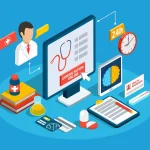
Best Features To Look For In A Hospital Feedback System
In today’s healthcare landscape, the quality of patient care is paramount. One essential tool for enhancing patient satisfaction and improving service quality is a robust hospital feedback system.
Such systems enable hospitals to gather valuable insights from patients, leading to continuous improvement in healthcare delivery.
This article explores the best features to look for in a patient feedback system and how it can be leveraged to foster a positive hospital experience.
Importance of a Patient Feedback System
A patient feedback system is a tool used by healthcare providers to collect, analyze, and act on feedback from patients about their experiences and satisfaction with the services provided.
This system helps enhance patient care by identifying areas for improvement and driving continuous quality enhancement.
Enhancing Patient Satisfaction
A well-designed patient feedback system helps healthcare providers understand the needs and concerns of their patients. By addressing these issues promptly, hospitals can significantly enhance patient satisfaction and loyalty.
Driving Continuous Improvement
Feedback from patients provides actionable data that can be used to identify areas for improvement. Implementing a hospital feedback system ensures that patient suggestions for hospital improvement are heard and acted upon, leading to better healthcare outcomes.
Key Features of an Effective Hospital Feedback System
A hospital feedback system is a tool designed to collect, analyze, and act on feedback from patients about their healthcare experiences.
It helps hospitals improve service quality, enhance patient satisfaction, and drive continuous improvement by addressing patient concerns and suggestions.
1. User-Friendly Interface
A hospital feedback system should have an intuitive and user-friendly interface. This ensures that patients of all ages and backgrounds can easily navigate the system and provide their feedback without any hassle.
2. Multi-Channel Feedback Collection
To accommodate the diverse preferences of patients, the system should support multiple feedback channels. These can include online surveys, mobile apps, kiosks, and paper forms. A versatile healthcare feedback system increases the likelihood of receiving comprehensive feedback.
3. Real-Time Data Analysis
Real-time data analysis is a critical feature that allows hospitals to monitor patient feedback as it is received. This enables immediate response to urgent issues, improving the overall hospital experience.
4. Anonymity and Confidentiality
Patients should feel secure in providing honest feedback. An effective patient feedback system ensures anonymity and confidentiality, encouraging more candid and constructive comments.
5. Customizable Surveys
Customizable surveys allow hospitals to tailor questions to specific departments or services. This targeted approach helps in gathering detailed insights into particular areas that require improvement.
6. Automated Reporting
Automated reporting features save time and resources by generating comprehensive reports on feedback trends and patterns. These reports can be used by hospital management to make informed decisions and implement necessary changes.
7. Integration with Hospital Management Systems
Seamless integration with existing hospital management systems ensures that feedback is incorporated into the broader healthcare workflow. This integration facilitates coordinated efforts in addressing patient concerns and enhancing service quality.
Benefits of Implementing a Hospital Feedback System
A hospital feedback system is a tool that collects and analyzes patient feedback to improve healthcare services, enhance patient satisfaction, and drive continuous quality improvement.
Improved Patient Care
By continuously monitoring and responding to patient feedback, hospitals can improve the quality of care provided. This leads to better patient outcomes and higher satisfaction rates.
Increased Patient Engagement
A hospital feedback system fosters a sense of involvement among patients. When patients feel that their opinions matter, they are more likely to engage positively with the healthcare provider.
Identification of Training Needs
Feedback can highlight areas where staff may require additional training. This ensures that all healthcare professionals are equipped with the skills and knowledge necessary to deliver exceptional care.
Benchmarking and Performance Tracking
Regular feedback collection allows hospitals to benchmark their performance against industry standards. This helps in identifying best practices and areas that need improvement.
Enhanced Reputation
Hospitals that actively seek and act on patient feedback are perceived as more responsive and patient-centric. This enhances the hospital’s reputation and attracts more patients.
Conclusion
A comprehensive hospital feedback system is an invaluable tool for healthcare providers. By incorporating features such as a user-friendly interface, multi-channel feedback collection, real-time data analysis, and customizable surveys, hospitals can effectively gather and utilize patient feedback.
This not only improves patient satisfaction but also drives continuous improvement in healthcare delivery. Implementing such a system demonstrates a commitment to providing high-quality care and fosters a positive hospital experience for all patients.
Frequently Asked Questions(FAQs)
What Is A Patient Feedback System?
A patient feedback system is a tool used by healthcare providers to collect and analyze feedback from patients about their experiences and satisfaction with the services provided.
How Can Patient Feedback Improve Healthcare Services?
Patient feedback provides valuable insights into areas where healthcare services can be improved. By addressing these areas, hospitals can enhance the quality of care and overall patient satisfaction.
What Are The Benefits Of Real-Time Data Analysis In A Feedback System?
Real-time data analysis allows hospitals to monitor feedback as it is received and respond promptly to any urgent issues. This improves patient satisfaction and helps in maintaining high standards of care.
Why Is Anonymity Important In A Hospital Feedback System?
Anonymity encourages patients to provide honest and candid feedback without fear of retribution. This leads to more accurate and valuable insights for the hospital.
How Can A Hospital Feedback System Be Integrated With Existing Hospital Management Systems?
Integration with existing hospital management systems can be achieved through software interfaces and APIs that allow the feedback system to share data seamlessly with other hospital systems.
Enhance Patient Care and NABH Compliance with LazyMonkey
LazyMonkey is your all-in-one solution for improving patient care, retaining more patients, and meeting NABH standards. Our powerful QR-based feedback tool enables you to capture real-time insights from patient feedback, discharge surveys, staff and doctor evaluations, and clinical research, while also streamlining inter-departmental communication.
Transform your healthcare facility today - reach out to us at hello@lazymonkey.in, or request a demo here!
Elevate Your Restaurant Experience with LazyMonkey
LazyMonkey’s QR-based feedback system helps you gather real-time insights from customers, track satisfaction levels, and enhance the dining experience. Get instant feedback on your menu, service, and ambience, and make data-driven improvements to boost repeat customers and reviews.
Improve your restaurant today – reach out to us at hello@lazymonkey.in, or request a demo here!
Empower Student Engagement and Campus Improvement with LazyMonkey
LazyMonkey offers a seamless way to gather student feedback, track satisfaction, and enhance campus life. From course evaluations to dorm feedback, our QR-based solution makes it easy to capture valuable insights and improve student retention.
Upgrade your university experience – contact us at hello@lazymonkey.in, or request a demo here!
Streamline Feedback and Drive Performance Across Your Enterprise/Franchise with LazyMonkey
Whether you manage one or multiple locations, LazyMonkey’s QR-based feedback system helps you gather real-time employee and customer feedback. Improve operational efficiency, track satisfaction, and make data-driven decisions to enhance brand consistency and growth.
Transform your franchise today – reach out to us at hello@lazymonkey.in, or request a demo here!
Enhance Customer Satisfaction and Service Standards in Banking with LazyMonkey
LazyMonkey empowers banks to capture real-time feedback from clients across branches. Improve customer experience, assess service quality, and ensure regulatory compliance with our QR-based solution, helping you retain clients and meet banking standards.
Elevate your bank’s customer care – contact us at hello@lazymonkey.in, or request a demo here!
Boost Customer Engagement and Mall Satisfaction with LazyMonkey
LazyMonkey’s QR-based feedback tool enables you to collect feedback from shoppers, track satisfaction, and enhance the mall experience. Gather insights on store services, cleanliness, and entertainment to create an unmatched customer journey.














